- On the occasion of International Day of Yoga 2025, Priyanka shares a conversation she had with a fellow sadhaka which took her down the rabbit hole of the Ajna Chakra and its significance in Sadhguru’s Isha Yoga practices.
“I can't fully describe my experiences. The effects were very subtle, but deep. One thing that I can say is that energies operating in ajna chakra, reduces the sense of “me.” You start to see things from a third party perspective, rather than from the narrow place of "me" and "mine"" said Nikhilesh Ghushe, an expert in Nyaya Shastra.
We were discussing Sadhguru's yoga practices. He has been a long time practitioner of the freely available Isha Kriya (now further simplified and offered as a 7-min practice in the Miracle of Mind
app).
I didn't exactly understand his reference to energies in Ajna Chakra because there is no such mention in Isha Kriya instructions. “The focus between the eyebrows”, he clarified. Aah, light bulb moment for me. Often during Sadhguru's kriya practices we do create a natural focus between the eyebrows (please don't practice by yourself - we have specific guidance about how and when to create this focus)
Nikhilesh further mentioned that Bhagavad Gita
also mentions this focus between the eyebrows. Naturally, I had to look it up. Here
is what the Bhagavad Gita says on the Focus between the Eyebrows
Stanza 5.27 of the Bhagavad Gita
states,
स्पर्शान्कृत्वा बहिर्बाह्यांश्चक्षुश्चैवान्तरे
भ्रुवो: |
प्राणापानौ समौ कृत्वा नासाभ्यन्तरचारिणौ
|| 27||
यतेन्द्रियमनोबुद्धिर्मुनिर्मोक्षपरायण:
|
विगतेच्छाभयक्रोधो य: सदा मुक्त
एव स: || 28||
In the
Dnyaneshwari, these verses are loosely translated as, (source wisdomlib)
Verse
5.27: “Having kept aloof (all) external
(sense-) contacts and directing the gaze betwist the eyebrows, making the
exhalation and the inhalation that move within nostrils, evenly balance one
another.
Verse
5.28:
With sense-centres, mind and intellect
under control: the sage who-making salvation his goal rids himself of (all)
desire, fear and anger: he verily is ever emancipated. (151)
I had goosebumps
while reading this because most Isha Yoga practitioners will easily relate with
this state where our breath is balanced, focus between the eyebrows and
mind/senses are under control.
Thanks to my urban upbringing, if I had read these Gita stanza’s without any practical yoga experience, I would think this is some exotic, high state to achieve which only great yogis and sages can. However, being a yoga practitioner, I know that the breath can be balanced quite easily with a simple practice like anulom vilom (alternate nostril breathing). And a mild focus
between the eyebrows happens with a slight upwards tilt of the face.
It is amazing how
simple movements and postures within our yoga practices can become
transcendental.
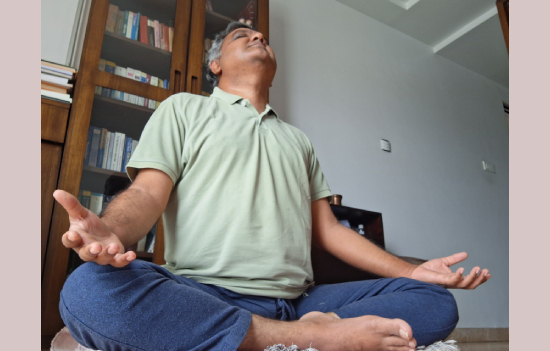 Nikhilesh
practicing the mild focus between the eyebrows.
Nikhilesh
practicing the mild focus between the eyebrows.
Isha
Yoga and Ajna Chakra
Sadhguru says, “At the Isha Yoga Center, the first thing
that we show people is the Agna, because that is most accepted in the world.
People who are doing sadhana on the Agna will always be revered. If we put the
Vishuddhi in the front, we would get labeled as weirdos. If we put the Anahata
in the front, people would think we are a confused lot. But if we put the Agna
in the front, people consider it as nice and really spiritual.” (source)
In fact, an
earlier logo of Isha Yoga Center was a triangle with a circle within it which
basically depicted the Agna Chakra.
There is another
poignant connection of the Ajna Chakra with Isha Yoga. It is depicted in this
stone panel in the Dhyanalinga temple.
In one of his past births Sadhguru was a tough Shiva Yogi having done severe sadhana. However, he has written that despite body breaking intensity he was not able to reach final enlightenment. “I decided to leave my
body and do the search without the body. It was at such a point that my Guru
entered my life. He touched me with his stick. And everything that needs to be
realized was realized.”
As the stone panel indicates, Sadhguru’s Guru tapped him on the spot between his eyebrows.
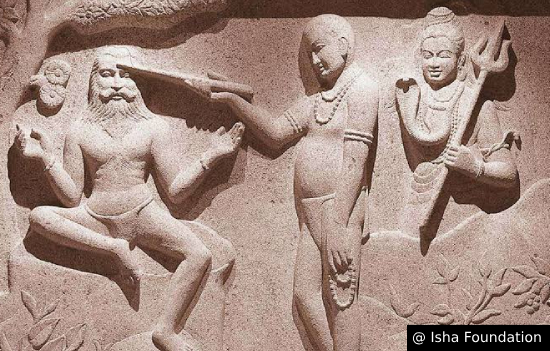
The
Quality of the Ajna Chakra
After many years of practicing Isha Kriya and also learning the Shambhavi Mahamudra in Sadhguru’s Inner Engineering program had passed, Nikhilesh had a health debacle.
One day in November 2023, I had a severe vertigo, and I collapsed. It turned out to be a small ischemic attack. Fortunately, we had the family vaidya, with his help I have recovered, without modern medicine. It looks like there is some bad karma that had to be paid for, and cleansed out of the system. And thanks to the third party perspective, I have some sense of those tendencies still in me, which needs cleansing. Since the day of collapsing, I'm not doing any hard practices but I slowly started doing Isha Kriya. It feels far more effective now, than it used to earlier. And hopefully, it'll keep deepening the realization that - I'm not the body, I'm not even the mind.”
The Ajna Chakra is associated with Vairagya, a quality that allows us to see things the way they are without our own mental distortions.
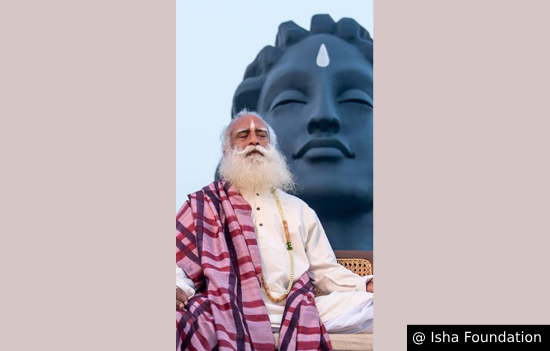 That is why we put Vibhuti on our forheads typically between the eyebrows and upwards.
That is why we put Vibhuti on our forheads typically between the eyebrows and upwards.
Caution:
The Information Jungle
Despite the Agna being a focus of Isha practices, I didn’t really think much about it in my twenty years of practice. Nikhiliesh brought it up recently and all of a sudden I began to connect the dots. I am highlighting this because I want to put a caution here.
Understanding the mechanics of our sadhana is not really a priority. Rather, doing the yoga practices consistently and then allowing the process to become a deep experience within ourselves is a priority. After 20 years of Sadhguru’s yoga practices, with deep experiences and knowing innately the transcendental quality of the spiritual path - I go down into these rabbit holes of knowledge. And these are rabbit holes because unless we are balanced and grounded enough in our sadhana, our minds can quickly latch onto wrong conclusions.
We can see on social media, many who take spiritual practices, mantras, sadhana guidances for granted because they are freely available. They will comment and ask for “ajna practices” or “specific devta” initiations. But they don't have a Guru or a well-structured system guiding them on what they should start with. They may not have the consistency or integrity to really do deep sadhana. They may not have a balanced system. But still, having consumed so much information, they think they are ready for something beyond their understanding.
Thus, I want to
caution you, to not get lost in all this info which we can barely grasp. Take
up a simple practice and wait for the Guru to guide you further. And if you
have found your Guru, then well, do his sadhana practices :)
The
Importance of All Chakras
While this article
focuses on the Ajna Chakra, it is important to note that for us to flower we
need to ensure all our chakras are functioning well. And not consider certain
chakras as higher or lower.
“We can speak in terms of lower and higher energy centers, but such language is often and too easily misunderstood. It is like comparing the foundation of a building to the roof. The roof is not superior to the foundation. The foundation of the building is more basic to the building than the roof. The quality, life span, stability and security of the building depends to a large extent on the foundation rather than the roof. But in terms of language, the roof is higher, and the foundation is lower.” Sadhguru
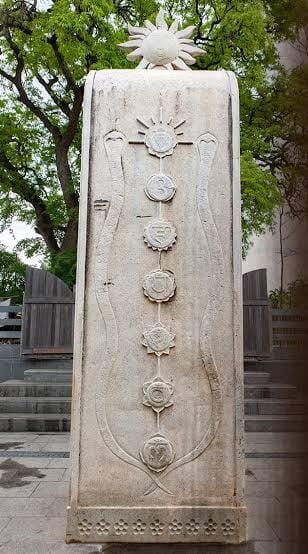 Pic from Dhyanalinga of Sthamba.
Pic from Dhyanalinga of Sthamba.
Typically, in yoga
the spiritual journey is identified as a movement of Kundalini from Muladhara
to the Sahasrara. Interestingly, Sadhguru says that moving from Ajna to
Sahasrara - that is from the highest state of discernment to enlightenment
where everything is one - is not a straightforward route. And this is where the
sadhaka needs the Guru the most.
Thus, I think it is significant that I have been doing the Isha practices for more than 20 years but I may not know anything much about its functioning. Because then, I simply follow Sadhguru’s instructions. This puts me in the state of, balanced breath, focus between the eyebrows, restrained sense/mind and trust in the Guru.
From my various
learnings which I have shared above, I think this is a powerful state.
Thanks to Nikhilesh for highlighting this aspect.
I hope you enjoyed
this article on the occasion of the International Day of Yoga 2025!
To read all articles by author
Author Priyanka Dalal has a profound love for spiritual exploration
and travel. She documents her adventures on her blog MapRoute and youtube channel InSpirituality
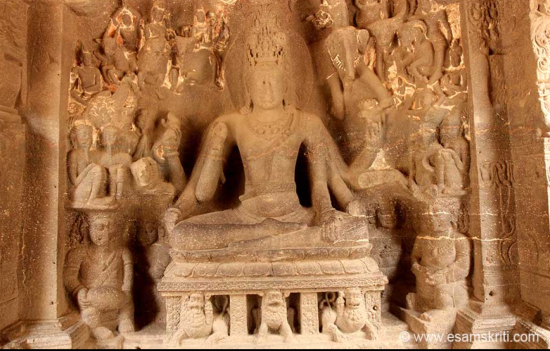 Kailasa Temple, Ellora. In front of that is Shiva in Shanti Mudra that you see. He is sitting in padmasana–the lotus pose of yoga. Hence he is called Mahayogi. His eyes are closed and is deep into meditation.
Kailasa Temple, Ellora. In front of that is Shiva in Shanti Mudra that you see. He is sitting in padmasana–the lotus pose of yoga. Hence he is called Mahayogi. His eyes are closed and is deep into meditation.
Also read
1. Kundalini
and Chakras
2. The
Chakras